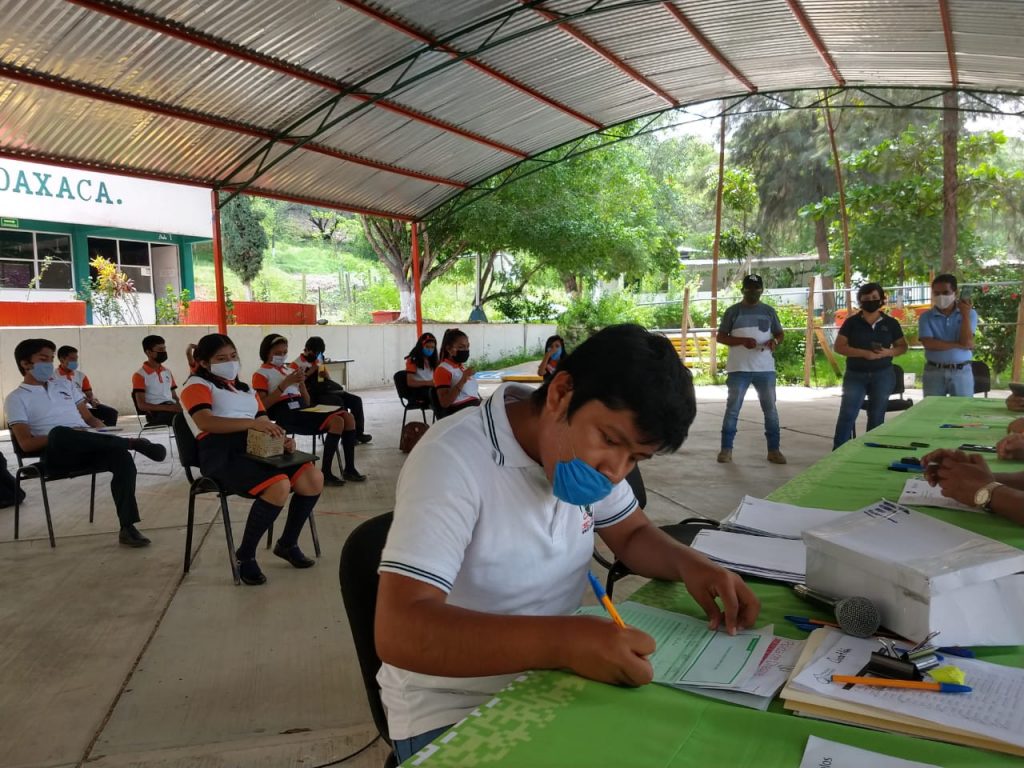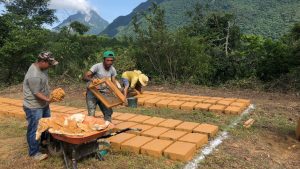Community resilience in the time of COVID-19: Lessons from the 2017 Mexican earthquakes
22 Oct 2020
This blog originally appeared on the Inter-American Foundation website.
For international humanitarian relief, it may seem faster and more efficient — maybe even cheaper through economies of scale — to respond with a “one-size-fits-all” approach to a natural disaster or pandemic like COVID-19. But over time, this option may actually be less sustainable. Communities that lead their own solutions tailored to their particular context are more engaged throughout recovery, ultimately rebuilding stronger.
The Inter-American Foundation (IAF) is not a humanitarian assistance agency, but we have often supported organizations rebuilding after natural disasters, as in the 1979 hurricane in the Dominican Republic, 2010 earthquake in Haiti, and hurricanes Stan and Mitch in Honduras and Nicaragua. In our 50 years of accompanying communities as they respond to natural disasters, we have observed that groups affected personally by events dedicate more creative energy to recovery.
Creativity from adversity
Three years ago this month, a series of earthquakes rattled residents in the Mexican states of Morelos, Oaxaca, Mexico State, and Puebla. Surrounded by the rubble of collapsed buildings and grieving lost loved ones, residents knew that rebuilding would be long and difficult. They would have to get creative. With IAF support, our community foundation partners in the affected states capitalized on their deep roots in the region and local leadership to successfully develop a long-term recovery and resilience plan.
Community foundations like Fundación Comunidad in Morelos gathered the best ideas from more than 40 grassroots organizations to address all of the secondary crises stemming from the earthquakes, such as food insecurity, youth unemployment and underemployment, and educational disruption.
One of those ideas came from a youth-led organization, which proposed establishing a stand on the campus of Morelos State University. The stand, called “Resiliente”, would sell fair trade coffee and locally-sourced food products and employ people with disabilities. Three years later, Resiliente has thrived with Fundación Comunidad’s startup funding and expanded into a coffee shop selling locally-crafted ceramics in downtown Cuernavaca, managed by 30 people with some type of disability.
As the entire world faces a long recovery from the social and economic crises caused by COVID-19, Fundación Comunidad’s creative approach and those of other community foundations like it contain several lessons for communities and funders.
Lessons learned
Four main lessons stand out from the Mexican earthquake experience that are applicable to our current context:
- Leave room for flexibility: In the immediate aftermath of the earthquakes, community foundations adjusted their traditional work and administrative processes to focus on the crisis.
- …But keep focus on the mission: The foundations were initially flooded with in-kind contributions like canned tuna and clothes from Mexican and U.S.-based organizations. Solidarity surges in times of crisis and communities needed short-term relief before local food systems had stabilized. This kind of quick response helps see people through a temporary disruption, but organizations can fall into mission creep if they lose a clear sense of purpose. Community foundations quickly honed in on their core mission—support for their communities’ long-term development. Within the first month after the earthquake, staff from community foundations started phasing out food donations and returned to funding community initiatives.
- Prioritize building community solidarity: The foundations emphasized the process of dialogue and collective decision-making because they recognized that solidarity was an asset. By letting local organizations and residents express their ideas and talent, they encouraged local ownership and promoted long-term sustainability.
- Rely on local networks and relationships: To quickly ramp up their humanitarian response in the wake of the disaster, locally-rooted community foundations drew from their networks and connections. One community foundation relied on a local network of coffee-producing organizations to facilitate logistics to distribute emergency supplies. They felt like they owned the process because they were using locally-sourced emergency goods to promote the local economy.
A new global crisis

Resilience is ultimately about both general preparedness and the ability to adapt to new circumstances. These lessons prepared Mexican community foundations to address an unexpected emergency — a world pandemic — that would strike in 2020. Community foundations acted quickly to rally communities and activate national and international support networks.
For example, Fundación Comunitaria Oaxaca created a program called “solidarity communities” that draws from local Mixtec practices of reciprocity to encourage people to purchase local goods and pursue local ideas to address COVID-19. Through the Pact for Early Childhood, community foundations created thousands of learning kits to promote children’s development and emotional wellbeing. Fundación Merced worked with organizations on strengthening their digital offerings. Comunalia, the network of Mexican community foundations, established a multi-donor COVID-19 Fund for its members drawing from Mexican funders as well as the IAF, C. S. Mott Foundation, and Coca-Cola Foundation to promote local economic recovery during and after the pandemic. They are working on standardizing how they respond to natural disasters, including pandemics.
And how has Resiliente fared? It has been living up to its name. The pandemic impacted the coffee shop’s sales, but the cooperative members were unfazed, regrouping and searching for alternatives using the community-centered techniques they had learned from the earthquake. They focused on new income opportunities, such as a delivery service for their products. Resiliente had learned a few lessons in resilience.
By: Gabriela Boyer, IAF Foundation Representative. These lessons were identified through workshops held with Mexican foundations and led by the IAF’s local liaisons in Mexico, Circe Peralta and Andrea Tapia. Please contact Gabriela for more information.


